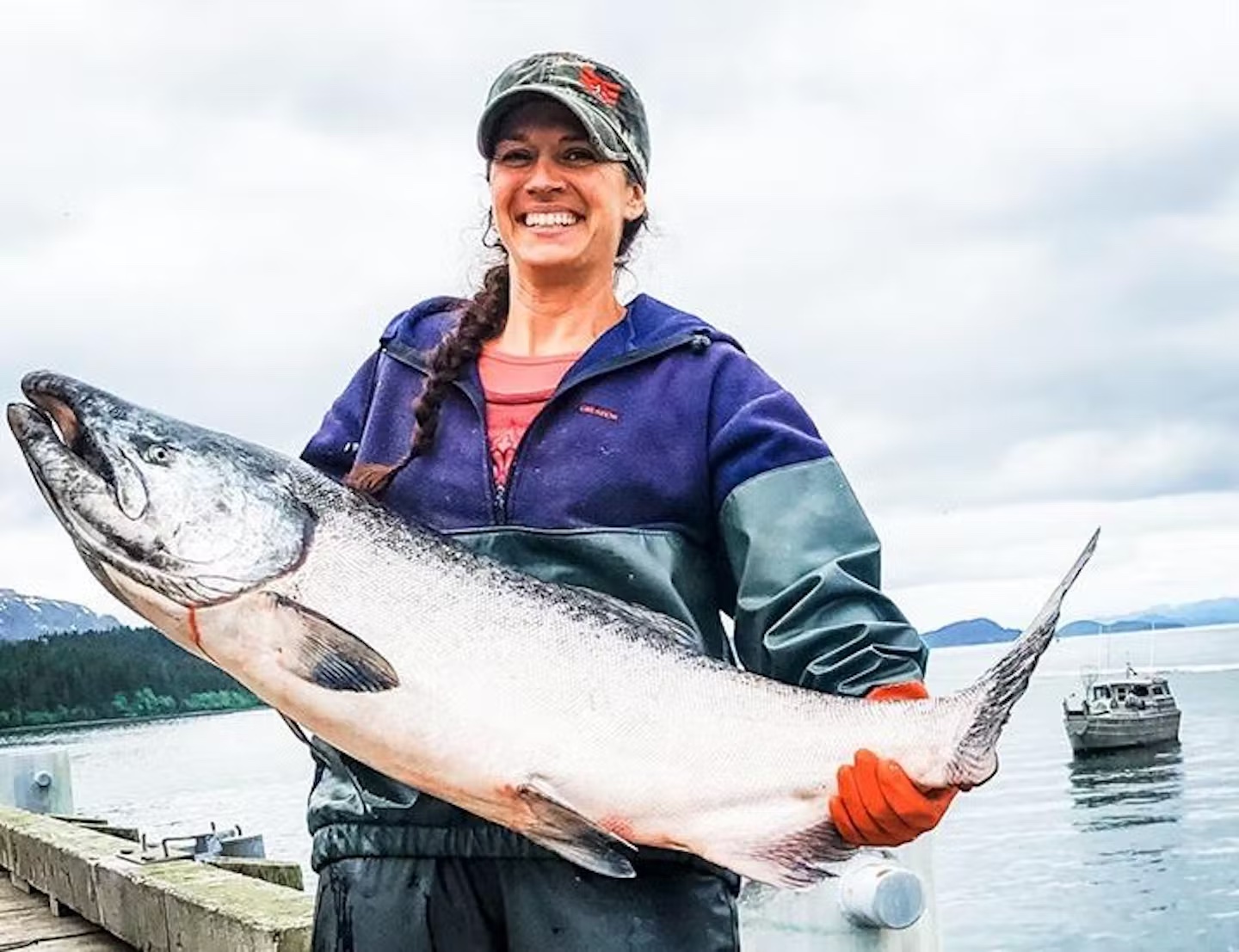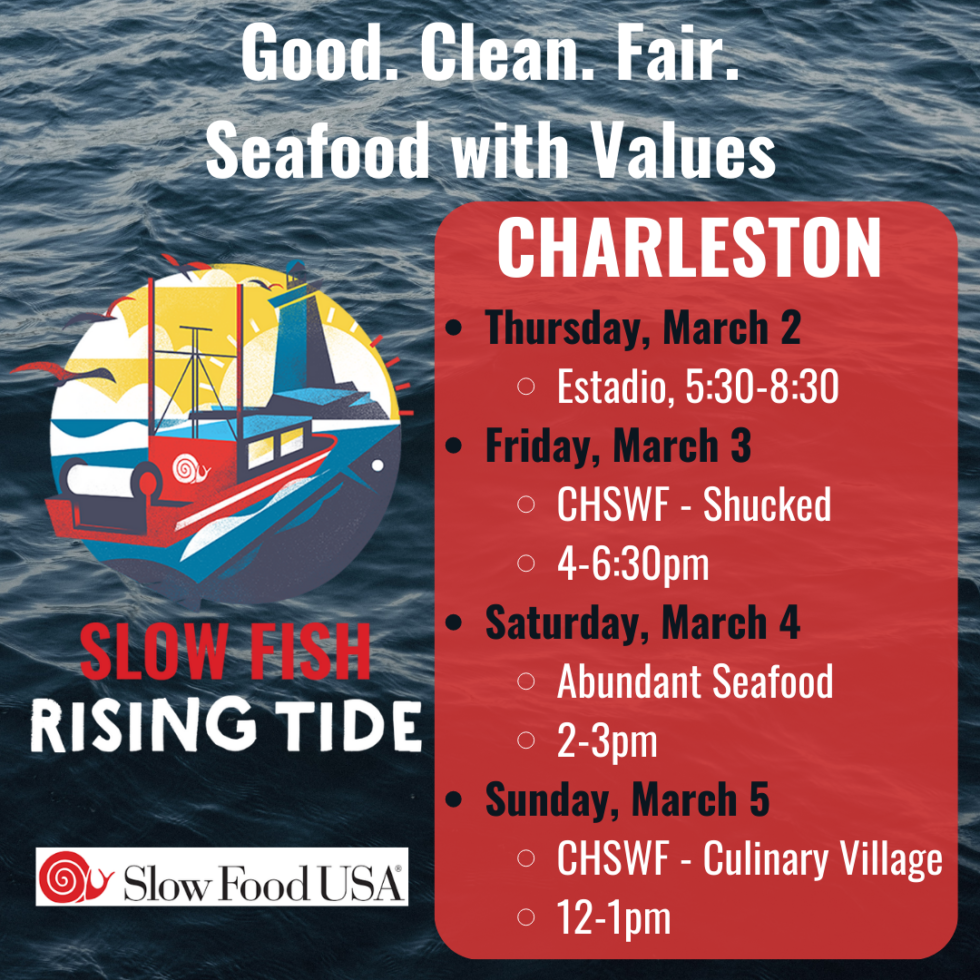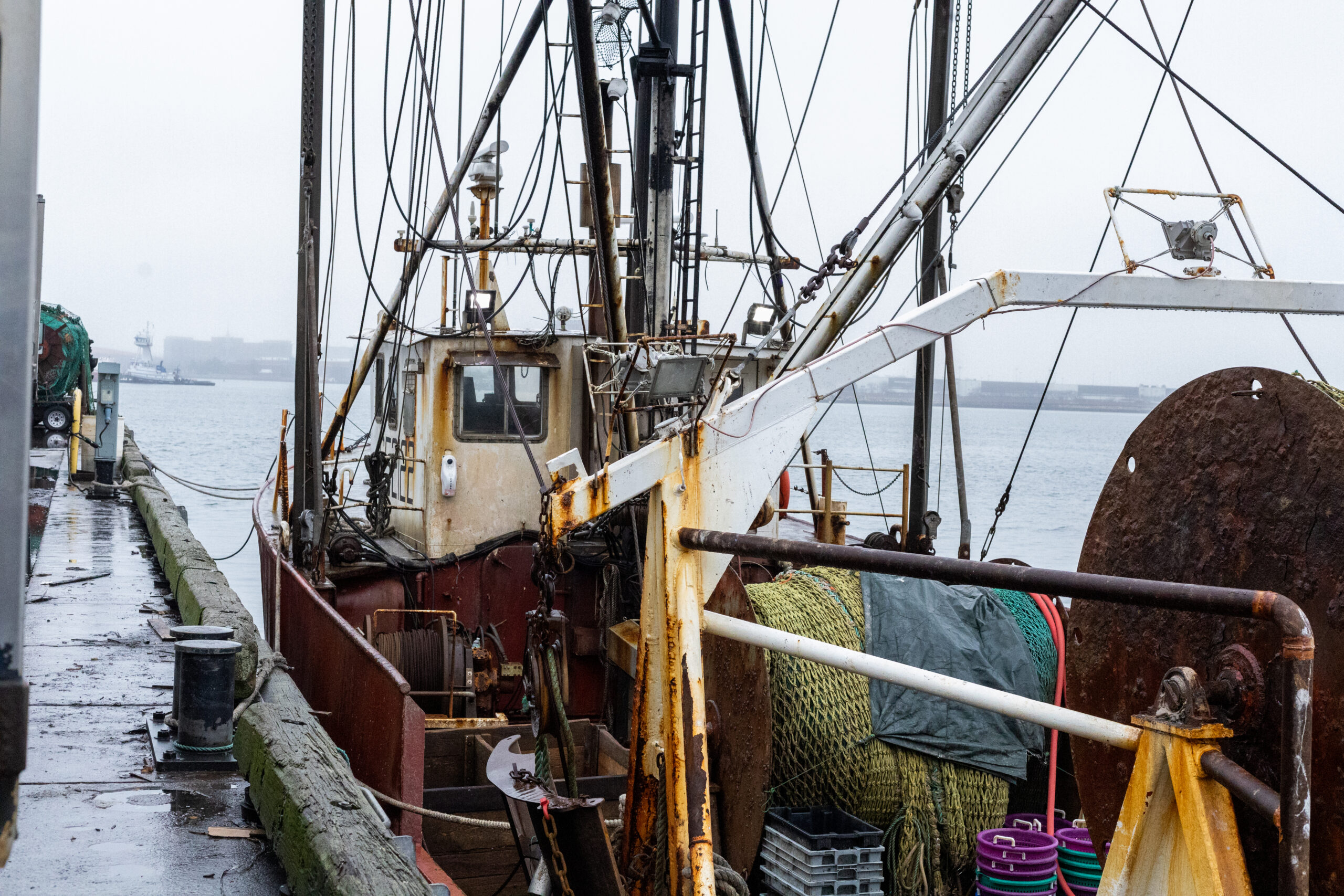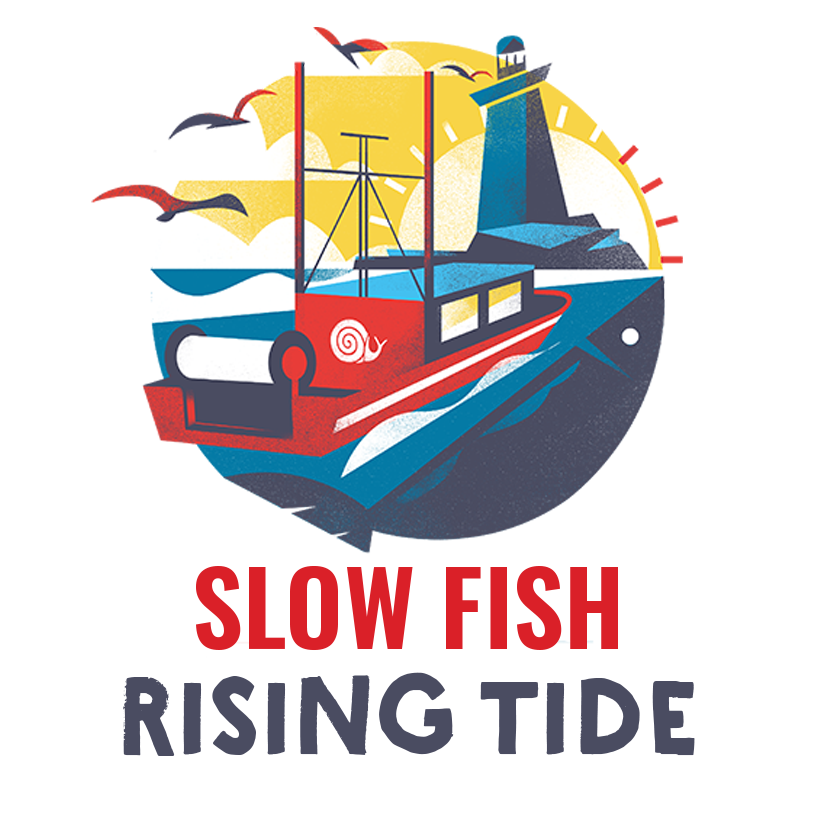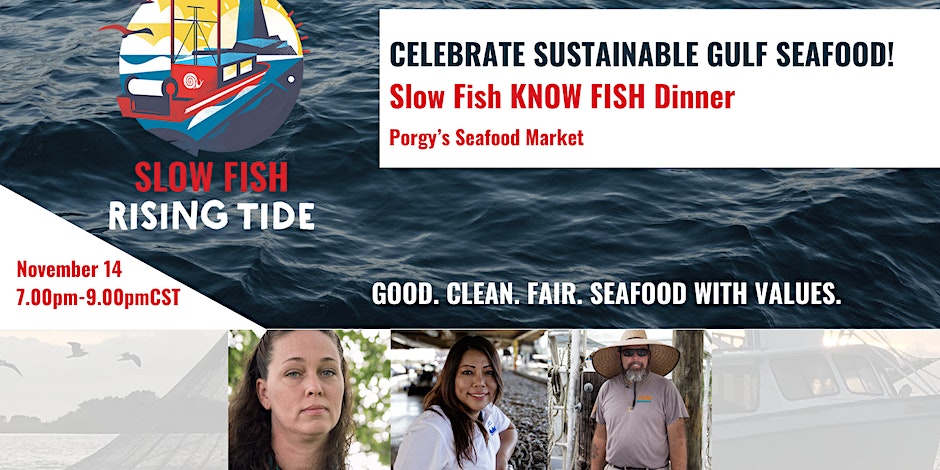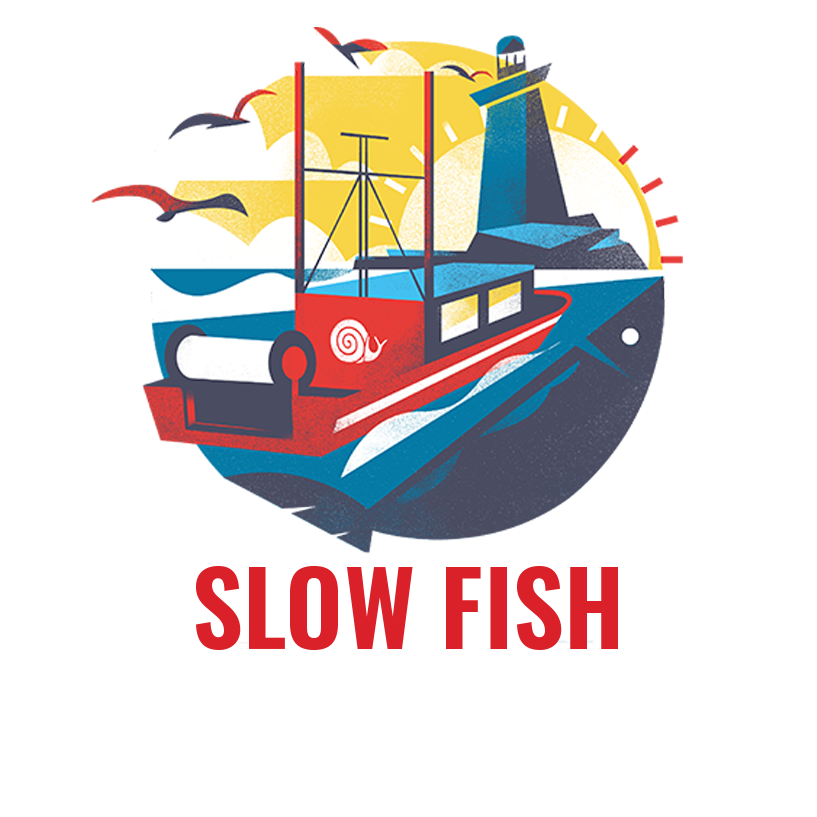
Rising Tide events are collaborations between Slow Fish North America, Slow Food USA, and Slow Food communities throughout the US and Canada. Through these partnerships, we will coordinate well-planned regional events centered on the shared values around food that is good, clean and fair. Our goal is to bring more people into the conversation about why seafood with values matters.
These events will be customized to each location, with local hosts taking the lead in choosing what type of event they feel would be optimal for their communities. Slow Fish North America and Slow Food USA will provide limited funding, planning support, written content, on-site expert perspectives, connections with local seafood harvesters and growers, and technical guidance on best practices for ensuring successful, engaging, community-building events.
Attendees will hear stories about how the seafood was harvested or grown, and learn about some of the myriad factors affecting seafood sustainability. Above all, we’ll reinforce the shared values as the compass for these events.
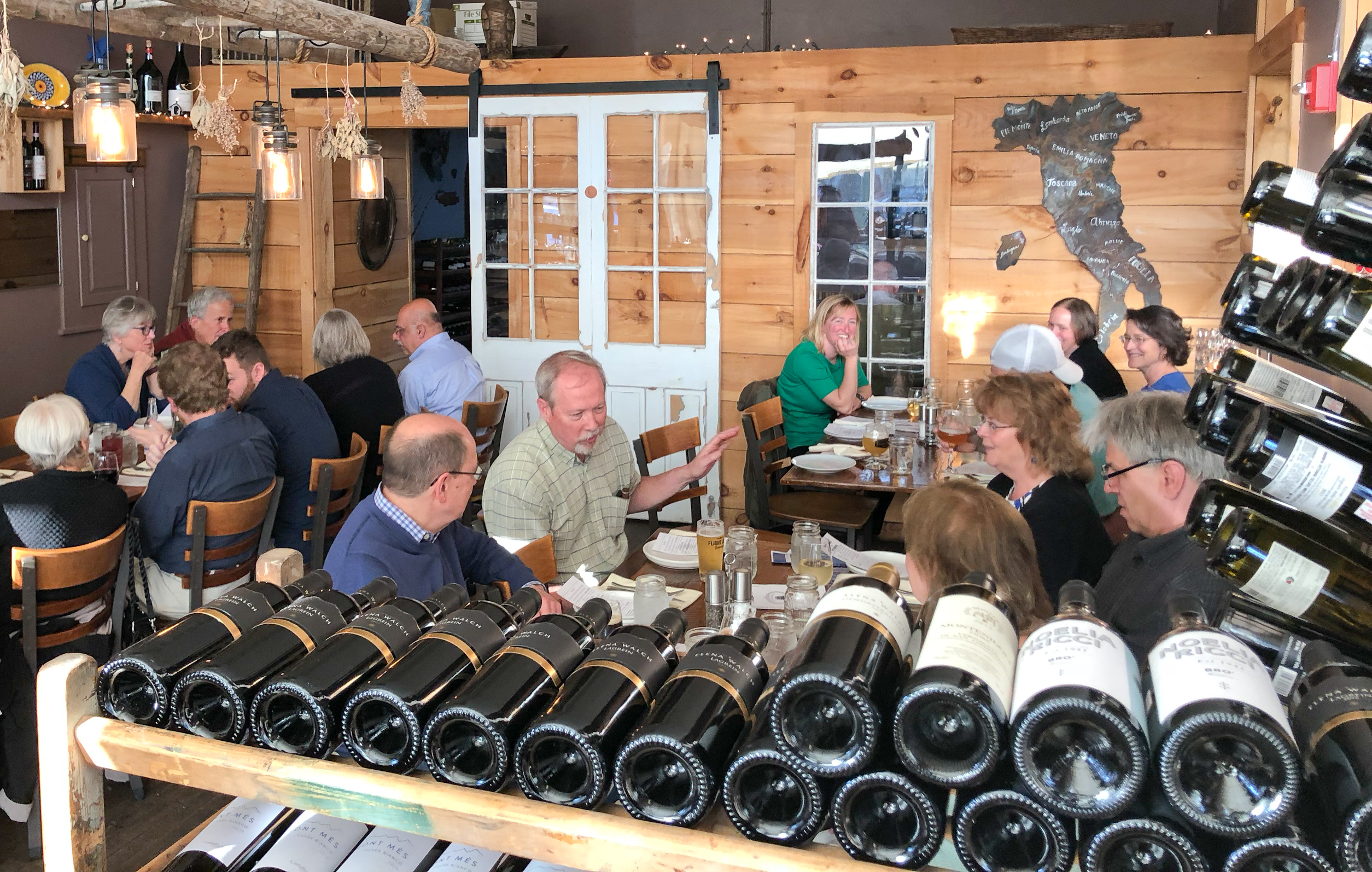
PAST AND FUTURE EVENTS
Rising Tide Menu
This menu allows host communities to choose the specific event that best suits their communities. Each of these events can be customized to suit the specific location and audience. Where applicable and appropriate, we may suggest incorporating content from other Slow Food communities, including Slow Cheese, Slow Meat, Slow Wine, Slow Beans, and the Cooks Alliance. Contact Mara Welton at mara@slowfoodusa.org for more information.
In-person gatherings
- KNOW FISH Dinners® : These events are great opportunities for people to hear the story of the seafood they’re eating from the fisherman or aquaculturist who harvested it. Local, community-based fish harvesters and kelp and bivalve farmers provide the seafood in collaboration with local chefs and restaurants who prepare the food either at a host restaurant or other venue. There may be multiple fishermen/farmers and chefs involved with different courses. Fishermen may tell the story of how they harvested the fish, while an oyster grower may talk about raising the bivalves from spat to market in three years. Chefs may talk about the importance of sourcing locally caught seafood.
- Seafood Throwdowns®: Chefs have one hour to prepare a delicious meal using a mystery seafood ingredient in a format that is similar to some popular TV shows. The critical difference is that these chefs are from the host community, and they’re using locally sourced, responsibly harvested seafood. Judges may include other chefs, folks in and around the seafood supply chain (like fishmongers, etc.) and one or two people from the audience. This is a great way to tell the story of the seafood from the perspective of chefs in action. Audience members get to taste the results of the cook-off.
- Slow Fish Chef Camp: These events convene local and regional chefs to discuss sourcing, building relationships with local fishermen and producers, and how to educate customers on why knowing where seafood comes from matters. Chefs learn about the bigger picture of seafood sustainability, and how that understanding impacts the decisions they make when sourcing, preparing, and telling the story of the seafood they sell in their restaurants. This offering may also include multiple components of this menu such as field trips or dinners.
- Slow Fish Film Festival: Themed event centered on films drawn from within the network followed by panel discussion. Examples of movies that bring seafood with values to the forefront: “The Wild”, “The Breach”, “Last Man Fishing”, among others. These events can be paired with food or without. They are good interactive discussions to prompt the community to think about some of the issues affecting local, regional and national seafood supply chains.
- Slow Fish Field Trips: Tour local fish wharves, processing plants, retail markets and meet local fish harvesters, oyster and kelp growers, fishmongers and others in and around the local supply chain. Learn about the network of people involved in bringing seafood from ocean to plate. Hear stories of life on the water, including the legal, climate and socio-economic challenges faced as well as solutions to those challenges. Learn how to engage in actions to support community-based fisheries. There can be food stops along the way.
- Slow Fish World Café: Picture a mini fair with multiple booths where fish harvesters, fishmongers, and NGO-type operations tell their stories, share ideas for supporting and improving local seafood systems, and dig into broader, more complex challenges such as catch shares, industrial aquaculture and climate change. This format gives attendees the opportunity to dip their toes into different conversations about the seafood supply chain to determine what interests them the most. These events can be paired with food.
- Real Food Real Stories: Pecha Kucha presentations (20 slides, 20 seconds each) by fish harvesters, seafood suppliers, chefs, foodies. Attendees get a sampling of different stories with a strong visual. These events can be paired with food. We encourage video or audio recordings to upload to the Slow Fish YouTube Channel.
- Snail of Approval collaborations: Slow Food USA and Slow Fish are collaborating to spotlight businesses (fishmongers, restaurants, distributors, processors, etc.) who exemplify the Slow Fish/Slow Food values of providing seafood that is good, clean and fair. Slow Fish and Slow Food can work with local Slow Food communities to coordinate Snail of Approval awards with events like KNOW FISH Dinners and Seafood Throwdowns, etc. Find more info about Snail Approval here.
- Slow Fish Deep Dives: Panel and/or interactive, round-table discussions exploring some of the most important issues facing local seafood systems. These discussions may focus on supply chains, catch shares (restrictive policy that consolidates power and access to shared resources), Indigenous access to traditional seafood harvests, climate change, industrial aquaculture and more.
Virtual events and resources
- Issues-oriented webinars: Slow Fish North America and Slow Food USA have a long history of curating thoughtful, in-depth conversations about topics like the Blue Economy, Indigenous access to natural resources, policy and efforts to support community-based fishermen. We can work with local Slow Food communities to plan important conversations featuring voices from within the community and those from across the country facing the same challenges.
- Online content: Slow Fish North America and Slow Food USA have a catalog of informative webinars and virtual discussions available online as resources to either help promote events or just to inform communities:
- Slow Fish 101: Learn what Slow Fish is, what it does, and how its values guide the network and its mission.
- Slow Fish North America 2021 Virtual Gathering: This was a six-day event featuring Deep Dive discussions on everything from supply chains to aquaculture, vanishing foodways, the Blue Commons (a counter-narrative to the Blue Economy) and Indigenous access to natural resources.
- Slow Fish Crew Together: This series of webinars sprouted from the repurposed energy diverted from the Slow Fish 2020 in-person event that was canceled due to Covid. Heartfelt, spiritually rewarding and thought-provoking conversations focused on everything from young fish harvesters to salmon and supply chains.

